Middle East Studies
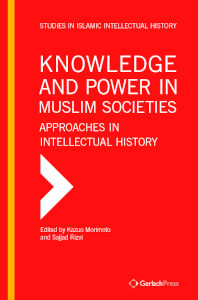
Knowledge and Power in Muslim Societies
Approaches in Intellectual History
Kazuo Morimoto, Sajjad Rizvi (eds.) – 2023-06
The study of Islam and of Islamic history is enjoying something of a revival with an emphasis on intellectual history and a greater concern with the ’subaltern’ within that. Why does religion continue to hold significance in our times? Are humans better off, adaptable, less violent, consistently unpredictable? How can we understand the course of our political history and the seeming dominance of democracy and its discontents, not least the legacies of coloniality and empire? While nationalist historiographies prevail in man...
more »
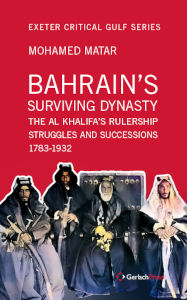
Bahrain’s Surviving Dynasty
The Al Khalifa’s Rulership Struggles and Successions 1783-1932
Mohamed Matar – 2023-06
The Al Khalifa of Bahrain is a long-standing dynasty that has established dispute resolution measures to overcome intra-tribal ambitions for power and wealth, replacing extra-constitutional rulership succession with primogeniture. Since their control over Bahrain began in 1783 until the British withdrawal from the Gulf in 1971, the Al Khalifa introduced ten senior ruling shaykhs, seven of whom experienced turbulent successions, and faced in-house rivalries and power-seeking disputes. This book provides valuable insights int...
more »
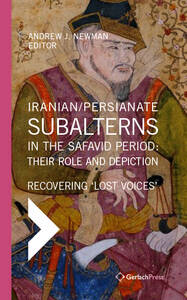
Iranian / Persianate Subalterns in the Safavid Period: Their Role and Depiction
Recovering ’Lost Voices‘
Andrew J. Newman – 2022
‘Subaltern studies’ refers to the importance of ‘subordinate’ groups in the making of history. The latter are usually defined as encompassing the urban and rural underclasses, the majority in any society, although generally the term is said to refer to all non-elites, including women. Most often the discourse concentrates on instances of social protest as points whereat the ‘subalterns’ make their ‘voices’ heard in response to, or even independent of, manipulations by the elite. The book draws on wide-ranging sources to b...
more »
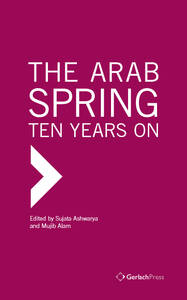
The Arab Spring: Ten Years On
Sujata Ashwarya, Mujib Alam (eds.) – 2022
It has been a decade since people across the Arab world rose up in revolt against their governments in 2010/11, demanding political empowerment, social reform and economic improvement. Pro-democracy protests, as they were called in common parlance, which spread rapidly through the mobilisation of social media calls, ended up overthrowing long-standing authoritarian regimes in Tunisia, Egypt, Yemen and Libya. That gave rise to hope for a more representative future, as well as economic reforms, after decades of mismanagemen...
more »
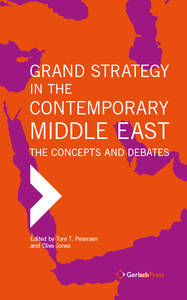
Grand Strategy in the Contemporary Middle East
The Concepts and Debates
Tore T. Petersen, Clive Jones (eds.) – 2022
This unique volume explores the role that Grand Strategy has played in the shaping of the Middle East and why, conceptually, its core principles still have traction in explaining the shifting alliances and dispensation of power across the region. When so much of the spatial as well as the geo-political boundaries of the Middle East are in flux, it is now time to revisit the very ideas that inform Grand Strategy that once again, are enjoying a wider intellectual renaissance in world affairs. Through a longitudinal met...
more »
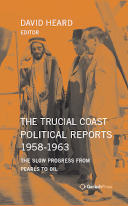
The Trucial Coast Political Reports 1958-1963
The Slow Progress from Pearls to Oil
David Heard – 2021
The Trucial Coast Political Reports are a unique record of events, commented on by a small group of British men living in Sharjah and Dubai. This was in the years leading up to the commencement of oil exports from the desert of Abu Dhabi. These men regularly met to discuss and negotiate with the Rulers of the Trucial States - sometimes in a state of mutual incomprehension - the conditions under which the Company (Petroleum Development/ Trucial Coast or PD/TC) would operate in their various territories. Boundaries and fronti...
more »
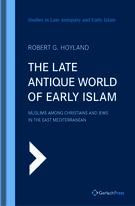
The Late Antique World of Early Islam:
Muslims among Christians and Jews in the East Mediterranean
Robert G. Hoyland (ed.) – 2021
This book offers a number of innovative studies on the three main communities of the East Mediterranean lands—Muslims, Jews and Christians—in the aftermath of the seventh-century Arab conquests. It focuses principally on how the Christian majority were affected by and adapted to their loss of political power in such arenas as language use, identity construction, church building, pilgrimage, and the role of women. Attention is also paid to how the Muslim community defined itself, administered justice, and regulated relations ...
more »
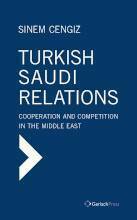
Turkish-Saudi Relations: Cooperation and Competition in the Middle East
Sinem Cengiz – 2020
Are the Middle East’s two heavyweights, Turkey and Saudi Arabia, friends or foes? What are the main drivers behind their rivalry or cooperation? The nature of their relationship has region-wide repercussions, affecting the calculations of both regional and global actors. This book is the first to offer a comprehensive and nuanced examination of the main drivers in the complex relationship between Turkey and Saudi Arabia, focusing on the role of domestic, regional and international dynamics. Three decades are examined: the ...
more »
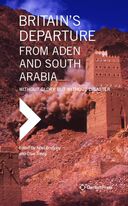
Britain’s Departure from Aden and South Arabia:
Without Glory but Without Disaster
Noel Brehony, Clive Jones (eds.) – 2020
Britain’s hasty departure from Aden and South Arabia after 128 years has often been presented as a humiliation at best and a disaster at worst. London’s hopes of handing power and sovereignty over to a friendly federal regime collapsed in the face of a nationalist uprising backed that enjoyed the support of Egypt. Five decades after the final British troops left Aden, academic experts and former British officials directly involved in the events that unfolded critically reflect on British withdrawal from South Arabia, the po...
more »
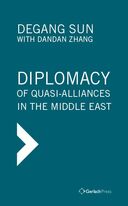
Diplomacy of Quasi-Alliances in the Middle East
with a foreword by Tim Niblock
Degang Sun, Dandan Zhang – 2020
Quasi-alliance refers to the ideation, mechanism and behavior of policy-makers to carry out security cooperation through informal political and security arrangements. As a “gray zone” between alliance and neutrality, quasi-alliance is a hidden national security statecraft. Based on declassified archives and secondary sources, this book probes the theory and practice of quasi-alliances in the Middle East. Four cases are chosen to test the hypotheses of quasi-alliance: - the Anglo-French-Israeli quasi-alliance during the Suez...
more »
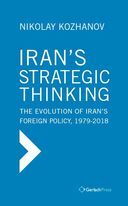
Iran’s Strategic Thinking:
The Evolution of Iran’s Foreign Policy, 1979-2018
Nikolay Kozhanov – 2018
What are the ideological motives behind Iran’s foreign policy? This new study examines Tehran’s twin desires to protect national interests and to project real power. Factors determining Iran’s foreign policy include: - Potential economic leader of the Middle East region - Key player in the oil and gas market - Centre of resistance against global Western domination - US and Israel policy - Syria as the bridge to Lebanon and Palestine There is a strong focus on primary sources, as well as interviews with EU, Russian and Middle...
more »
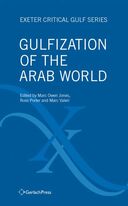
Gulfization of the Arab World
Marc Owen Jones, Ross Porter, Marc Valeri (eds.) – 2018
From projecting ideology and influence, to maintaining a notion of ‘Gulfness’ through the selective exclusion or inclusion of certain beliefs, cultures and people, the notion of Gulfization is increasingly pertinent as Gulf countries occupy a greater political and economic role in wider Middle East politics. This volume discusses the notion of Gulfization, and examines how thoughts, ideologies, way of life and practices are transmitted, changed, and transduced inside and outside the Gulf. From historical perspectives such as...
more »
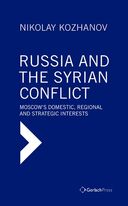
Russia and the Syrian Conflict:
Moscow’s Domestic, Regional and Strategic Interests
Nikolay Kozhanov – 2016
This book is the first to offer a comprehensive survey of Moscow’s foreign policy interests in Syria. The author considers the Kremlin’s diplomacy on Syria within the broader system of Russian foreign policy in the Middle East; he analyses the influence of Russian domestic dimensions on Moscow’s approaches to the subject; and he considers how Moscow’s priorities in Syria have evolved during the last five years and what factors influenced this evolution. Key factors considered include: - Russian presence in the Middle East be...
more »
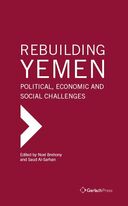
Rebuilding Yemen:
Political, Economic and Social Challenges
Noel Brehony, Saud Al-Sarhan (eds.) – 2015
As Yemenis start planning the reconstruction and rebuilding of their country after recent turmoil they face huge challenges in every major sphere. This book discusses the political and economic background and analyses the most important issues: - the option of improved governance through a federal government - addressing the powerful and patronage networks of the previous regime - investing in Yemen’s human and natural resources to compensate for falling revenues from oil and gas - maintaining rural life through reduced depe...
more »
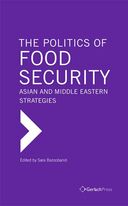
The Politics of Food Security: Asian and Middle Eastern Strategies
Sara Bazoobandi (ed.) – 2014
The international food system is increasingly at risk. Increasing demand, limited and diminishing resources and rising volatility are putting new pressures on the agriculture sector globally. One of the growing critical threats to global stability and security is the inadequacy of food resources. This threat,exacerba-ted by global population growth, is illustrated by shifts in consumption patterns toward protein-rich diets and the growth of multinational food retail, which bring about a greater reliance on food imports. This...
more »



